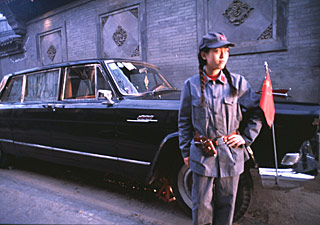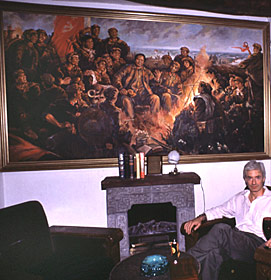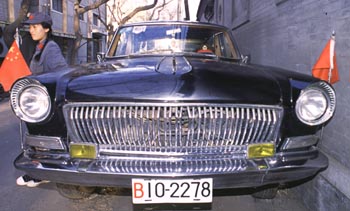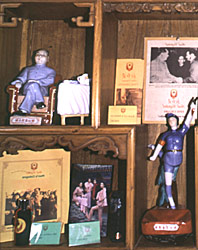Driving Mrs. Mao's Car
Beijing's latest buzz is a blast from the past - Cultural Revolution Cruisin' in a big Red Flag limo. It's all the brainchild of an American entrepreneur who is the King of Commie Kitsch.
By Ron Gluckman/Beijing, China
AS WE NEAR TIANANMEN SQUARE, the guide points out several historic homes. One belonged to an old Imperial concubine. Two more to warlords, turn-of-the-century strongmen who carved out fiefdoms during China's worst anarchy. "And over there," she says, "is where the last Ming Emperor hung himself on a tree."
 Unusual sights, to be sure, but equally remarkable are the reactions, from
passing cars and people on the square. Heads turn, register surprise, then
appreciation. That's because we're cruising the communist capital by stretch
limousine.
Unusual sights, to be sure, but equally remarkable are the reactions, from
passing cars and people on the square. Heads turn, register surprise, then
appreciation. That's because we're cruising the communist capital by stretch
limousine.
And not just any limo, but a hand-tooled Red Flag, built here in the era of one-upmanship, when China chased Cold War rivals Russia and the USA. Only a few score of these extravagant autos were crafted, and perhaps just two 1970s-era icons are still rolling around Beijing, says the owner. Then he passes around wine and caviar.
The decadent touches only highlight what, in China's capital these days, is the utmost in Cultural Revolution kitsch: the car, first and foremost, but also our guide, in camp Red Detachment of Women gear, while copies of Chairman Mao's infamous "Little Red Book" lay atop each leather-upholstered armrest.
The newest, most outlandish way to see Beijing is no bargain - $225 for an hour tour, including caviar and wine or champagne. Yet among visiting executives looking for a buzz in Beijing, the Red Capital car tour constitutes the coolest thrill in ages.
There's titillation, too, to a tour that would have been unthinkable just a couple years ago, perhaps even a capital offense during the period it mockingly celebrates.
And Cultural Revolution cruising isn't the only lark for those in a Mao-stalgic mood. After the car is parked in Beijing's old Hutongs (old alleys), most follow the tour with a Mao-tai in a bar furnished like Zongnanhai, Mao's Beijing headquarters. You can also dine on Mao's favorite dishes, retire to the Chairman's Suite at the nearby Red Capital Guesthouse or puff Cuban cigars in an underground bar, once a bomb shelter, while classic Cultural Revolution propaganda films are projected on the brick walls.
 Lest one think that Mao's stodgy stronghold has finally learned to chuckle
over its past excesses, all these retro-revolutionary attractions are concocted
by American Laurence Brahm. That's another surprise, since this lawyer and
consultant is best known for self-published books praising business in China;
his most recent, "China's Century, The Awakening of the Next Economic
Powerhouse," has a forward by Premier Zhu Rongji.
Lest one think that Mao's stodgy stronghold has finally learned to chuckle
over its past excesses, all these retro-revolutionary attractions are concocted
by American Laurence Brahm. That's another surprise, since this lawyer and
consultant is best known for self-published books praising business in China;
his most recent, "China's Century, The Awakening of the Next Economic
Powerhouse," has a forward by Premier Zhu Rongji.
Now, the unabashed Beijing booster who first came to China as a student in the 1980s, is an entrepreneur. His Red Capital brand makes him King of Commie Kitsch.
Red Capital Restaurant opened in 1999, followed by Mr. Brahm's boutique hotel last summer. Both are crammed with Mao-mentos - Cultural Revolution paintings and figurines, antique phones, radios and actual chairs from Zongnanhai - but the car is something else.
Simply obtaining such a treasure is astounding. Mr. Brahm claims it once chauffeured infamous Jiang Ching, wife of the Chairman and lynchpin of the Gang of Four, on her terrifying rounds of town. The claim is impossible to verify but - what the hey - think of it, we're driving Mrs. Mao's car!
Around the Forbidden City we roll, past Zhou Enlai's house and the last remnants of Kublai Kahn's Beijing palace. Past an early prime minister's courtyard, and the birthing grounds of the May 4th Movement. "You have five periods of architecture on exhibit here," says Mr. Brahm when we speed past the dowdy Beijing Hotel, butted up against the gaudy Oriental Plaza. Christmas lights line the main boulevard, and Vanessa Mae fiddles on the car stereo. Could it be more surreal?
Mr. Brahm flicks a switch, and up rises a glass screen, separating guide and driver from our privileged tour group. "So officials could discuss important state matters," explains Mr. Brahm, startled as I scream a quick test at the driver, who doesn't blink. The old rods in the engine tick loudly, but the Reds clearly understood the concept of the "Cone of Silence."
 Mr. Brahm says the car was made by the Number One Auto Works in Chongqing in
the mid-1970s, when the chief engineer was President Jiang. Whatever the outcome
of his current battle to join Mao and Deng on the podium of patriarchs, the prez
is heads above the pack in building cool cars. Huge, too. The limo stretches for
half a block, with lovely white walls and distinctive Red Flag ornaments. The
rear lights look like traditional Chinese lanterns.
Mr. Brahm says the car was made by the Number One Auto Works in Chongqing in
the mid-1970s, when the chief engineer was President Jiang. Whatever the outcome
of his current battle to join Mao and Deng on the podium of patriarchs, the prez
is heads above the pack in building cool cars. Huge, too. The limo stretches for
half a block, with lovely white walls and distinctive Red Flag ornaments. The
rear lights look like traditional Chinese lanterns.
A second limo is permanently parked at the entrance to Mr. Brahm's popular Red Capital Restaurant, inside a lovingly-restored Qing courtyard. It's stocked with items from Mr. Brahm's fledgling Red Capital collection. Some resemble chintzy lamps and statues sold at local junk markets, but with his Red Capital logo tacked on. Foreign wine and cigars are similarly re-branded.
 Other items are more original, like the Chairman's Cologne, touted thusly:
"Essence of Manchurian Pine, hints of Red Guard leather, mist of Mongolian
wind." Sometimes over-the-top, such descriptions are a giggle, especially
in the restaurant. The menu is required reading. You don't merely have Mao's
favorite "brain food" - fatty pork - but sections like "Entering
the Moon Gate" (basically soup) and the exquisitely described "Empress
Dowager's Dream."
Other items are more original, like the Chairman's Cologne, touted thusly:
"Essence of Manchurian Pine, hints of Red Guard leather, mist of Mongolian
wind." Sometimes over-the-top, such descriptions are a giggle, especially
in the restaurant. The menu is required reading. You don't merely have Mao's
favorite "brain food" - fatty pork - but sections like "Entering
the Moon Gate" (basically soup) and the exquisitely described "Empress
Dowager's Dream."
It's camp literature, the best writing yet by Mr. Brahm, who certainly isn't the first with a fetish for Cultural Revolution-chic. Last year, Sotheby's sold over $50,000 worth of Mao buttons and badges in a boisterous online auction.
Yet nobody ever had the audacity to brand the Cultural Revolution, which is kind of like Revenge of the Roadies. Mr Brahm plans to franchise not only the trinkets, but even the concept of his clubs. This naturally begs the question, is the world ready for Planet Mao?
But what I really want to know is who wants to smell like the Chairman?
Ron Gluckman is an American reporter and former entertainment writer who has been roaming around Asia since 1991, when he was based in Hong Kong. Since 2000, he has been based in Beijing, covering China for a wide variety of publications including the Wall Street Journal, which ran this piece in April 2002.
To return to the opening page and index
push here
[right.htm]
